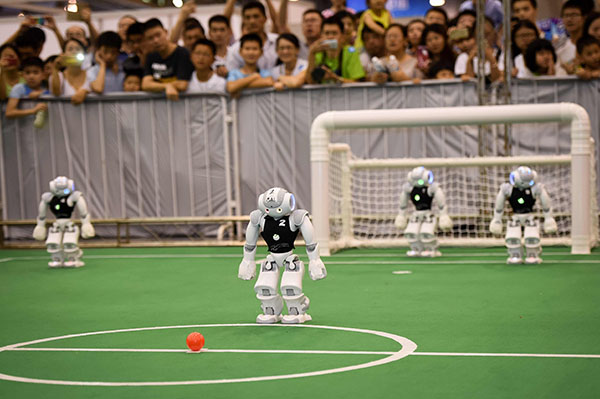 |
|
Robots compete in a soccermatch on Sunday as part of the 19th RoboCup in Hefei, the capital of Anhui province. The five-day annual contest includes soccermatches and contests for robots programmed for rescues and services in the home. Zhang Duan / Xinhua |
More than 2,000 robotics professionals and fans from 47 countries and regions worldwide gathered in Anhui province on Sunday as the 19th RoboCup kicked off in Hefei.
The five-day annual contest includes robot soccer matches and contests for robots programmed in rescue and home service.
"This year, we have new challenges in each field - new rules, new tasks, new games, etc. These challenges will push us toward our final goals," RoboCup Federation President Itsuki Noda said.
Noting that a series of battles in Hefei during the late Eastern Han Dynasty (AD 25-200) and the Three Kingdoms period (AD 220-280) lasted about 50 years, Noda said that "our RoboCup target is also set for 50 years. And I hope that like the famous battles of Hefei in the Three Kingdoms, our challenge here will remain in the history books."
The RoboCup was launched by Japanese researchers in 1993 in an attempt to use soccer to promote the advancement of robotic science and technology in their own country. The ultimate goal was to build a robot soccer team that could compete with human World Cup champion teams by 2050. The project received unexpected attention from researchers outside Japan, who requested that organizers make the contest international. Accordingly, the RoboCup Federation was established and began holding the RoboCup annually in different cities worldwide.
"These games are the most innovative RoboCup in history," said Chen Xiaoping, president of the Chinese Regional Committee of the RoboCup Federation.
The 19th RoboCup differs from all of the previous games in several aspects, Chen said.
For one, organizers adapted the evaluation standards of service robots to attach more value to cutting-edge technologies.
"For example, face recognition is already a mature technology, so we reduced the score weight on this technology and put more emphasis on innovative technologies like the robots' ability to recognize people's movements," Li said.
Moreover, the committee introduced an automatic scoring system that uses 12 cameras to monitor the operation of a robot and score its performance. Before that, the scoring was less accurate.
"The research in service robots is undergoing a transfer from fundamental research to industrial production. One of the bottlenecks of mass production is quality control. So far, we do not have any proven technologies, procedures and equipment to test the performance of service robots anywhere in the world," Chen said.
"An automatic scoring system of service robots will be the first step toward a whole set of technologies, procedures and equipments to test mass-produced service robots," he said.
This is the second time the RoboCup has taken place in a Chinese city. Suzhou, Jiangsu province, hosted the event in 2008.
Contact the writers through [email protected]
